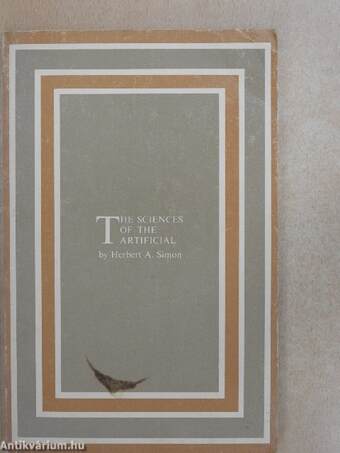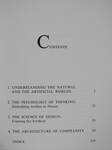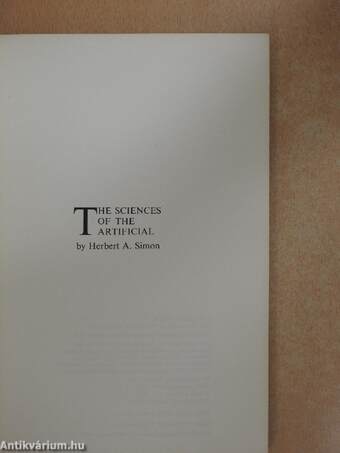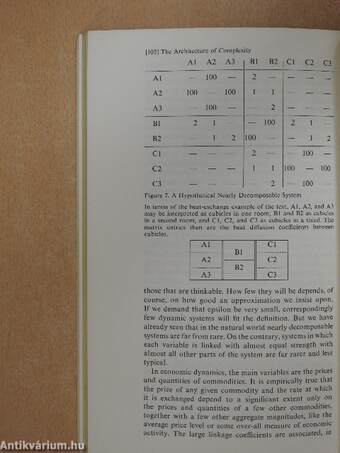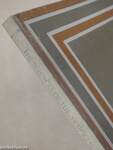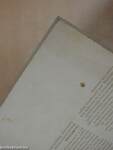1.067.715
kiadvánnyal nyújtjuk Magyarország legnagyobb antikvár könyv-kínálatát

VISSZA
A TETEJÉRE
JAVASLATOKÉszre-
vételek
The Sciences of the Artificial
| Kiadó: | The M. I. T. Press |
|---|---|
| Kiadás helye: | Cambridge |
| Kiadás éve: | |
| Kötés típusa: | Ragasztott papírkötés |
| Oldalszám: | 122 oldal |
| Sorozatcím: | Karl Taylor Compton Lectures |
| Kötetszám: | MIT 136 |
| Nyelv: | Angol |
| Méret: | 20 cm x 13 cm |
| ISBN: | 0-262-69023-3 |
| Megjegyzés: | Néhány fekete-fehér ábrát tartalmaz. |
naponta értesítjük a beérkező friss
kiadványokról
naponta értesítjük a beérkező friss
kiadványokról
Előszó
TovábbFülszöveg
The Sciences of the Artificial by Herbert A. Simon The Sciences of the Artificial reveals the design of an intellectual structure aimed at accommodating those empirical phenomena that are "artificial" rather than "natural." The goal is to show how empirical sciences of artificial systems are possible, even in the face of the contingent and teleological character of the phenomena, their attributes of choice and purpose. Developing in some detail two specific examples—human psychology and engineering design— Professor Simon describes the shape of these sciences as they are emerging from developments of the past 25 years.
"Artificial" is used here in a very specific sense: to denote systems that have a given form and behavior only because they adapt (or are adapted), in reference to goals or purposes, to their environment. Thus, both man-made artifacts and man himself, in terms of his behavior, are artificial. Simon characterizes an artificial system as an interface between two... Tovább
Fülszöveg
The Sciences of the Artificial by Herbert A. Simon The Sciences of the Artificial reveals the design of an intellectual structure aimed at accommodating those empirical phenomena that are "artificial" rather than "natural." The goal is to show how empirical sciences of artificial systems are possible, even in the face of the contingent and teleological character of the phenomena, their attributes of choice and purpose. Developing in some detail two specific examples—human psychology and engineering design— Professor Simon describes the shape of these sciences as they are emerging from developments of the past 25 years.
"Artificial" is used here in a very specific sense: to denote systems that have a given form and behavior only because they adapt (or are adapted), in reference to goals or purposes, to their environment. Thus, both man-made artifacts and man himself, in terms of his behavior, are artificial. Simon characterizes an artificial system as an interface between two environments—inner and outer. These environments lie in the province of "natural science," but the interface, linking them, is the realm of "artificial science." When an artificial system adapts successfully, its behavior shows mostly the shape of the outer environment and reveals little of the structure or mechanisms of the inner. The inner environment becomes significant for behavior only when a system reaches the limits of its rationality and adaptability, and contingency degenerates into necessity.
Separating the contributions of the two environments, Simon identifies the complexity in human behavior as a reflection primarily of the outer environment: a man, he asserts, viewed as a behaving system, is quite simple. The apparent complexity of his behavior is largely a reflection of the complexity of the environment in which he finds himself. Examining this thesis in the light of evidence from recent work in cognitive psychology and linguistics, Simon sets forth an information-processing theory of man's thinking processes that provides an operational, empirically based alternative to behaviorism. He then uses this description of an information-processing system, combining it with other developments in computer science and optimization theory, to propose a curriculum for the emerging science of engineering design.
Beyond his specific examples, the author indicates how the sciences of the artificial are relevant to economics, management and administration, medicine, education, architecture, art. , to all fields that create designs to perform tasks or fulfill goals and functions.
Herbert A. Simon is Richard King Mellon Professor of Computer Science and Psychology at Carnegie-Mellon University. Three of the four chapters in this book are based on the author's Karl Taylor Compton Lectures, delivered at M.l.T. in the spring of 1968.
The MIT Press
Massachusetts Institute of Technology Cambridge, Massachusetts 02142
Vissza
Témakörök
- Közgazdaságtan > Menedzserképzés, marketing
- Idegennyelv > Idegennyelvű könyvek > Angol > Műszaki
- Idegennyelv > Idegennyelvű könyvek > Angol > Közgazdaságtan > Menedzserképzés, marketing
- Műszaki > Informatika > Számítógép > Programozása
- Műszaki > Technika > Automatizálás > Egyéb
- Pszichológia > Alkalmazott lélektan > Egyéb
- Pszichológia > Idegennyelvű > Angol
- Filozófia > Témaköre szerint > Szakfilozófiák
- Idegennyelv > Idegennyelvű könyvek > Angol > Filozófia > Témaköre szerint > Szakfilozófiák
- Idegennyelv > Idegennyelvű könyvek > Angol > Pszichológia
- Műszaki > Idegennyelv > Angol



